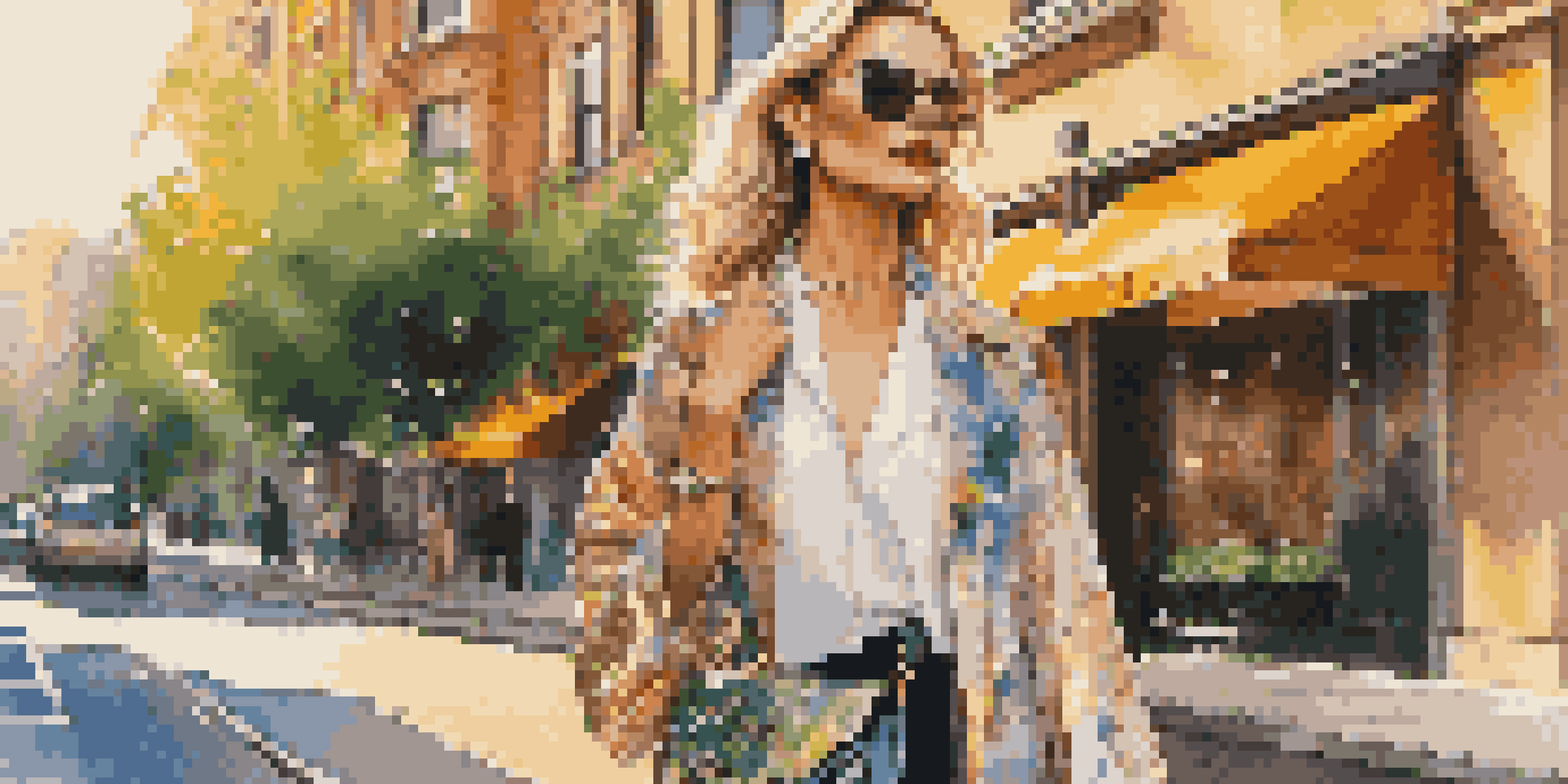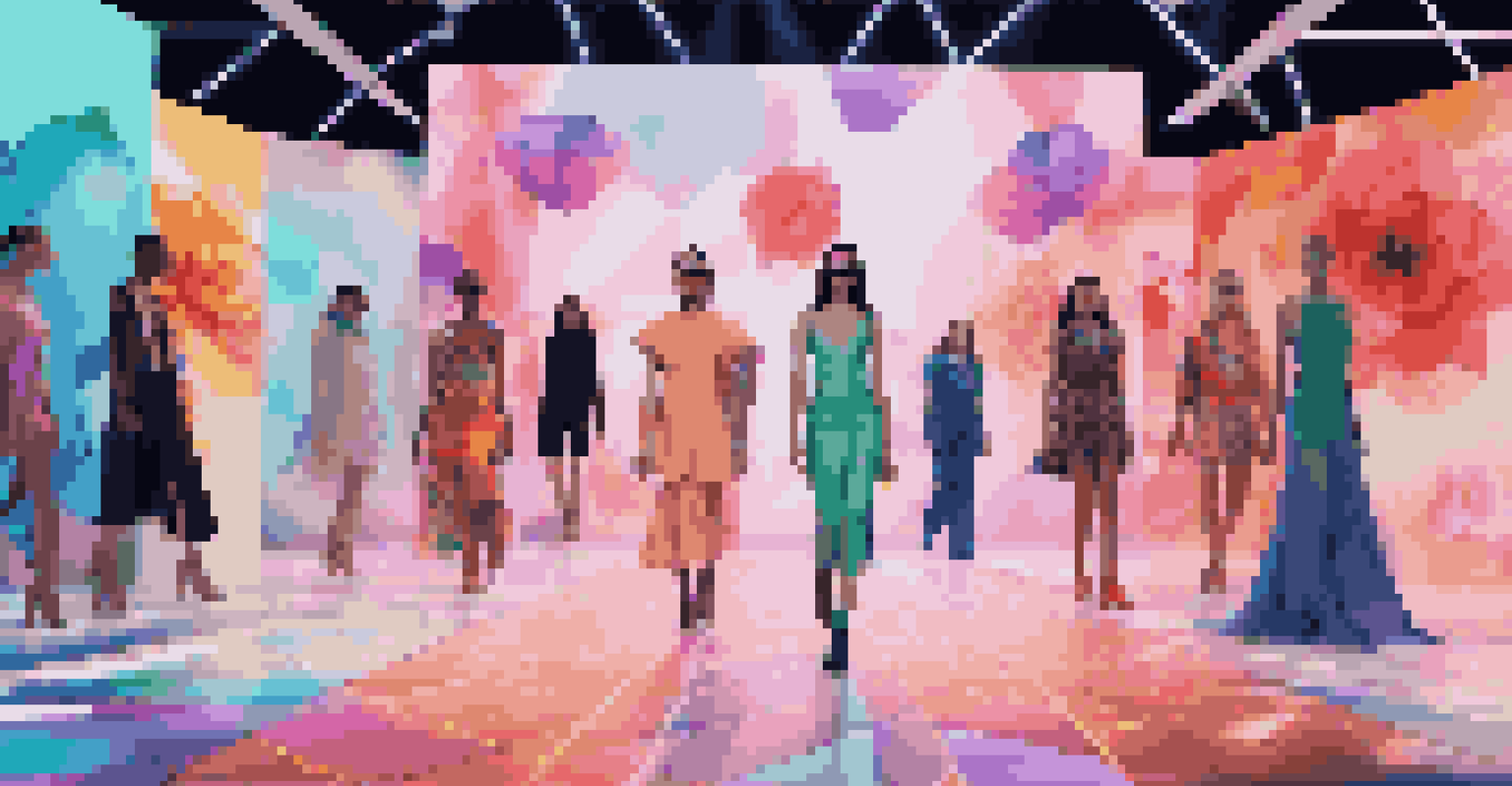The Future of Luxury Fashion Icons in a Digital World

The Rise of Digital Influencers in Luxury Fashion
In today's digital age, traditional fashion icons are sharing the spotlight with digital influencers. These influencers often have massive online followings, making them powerful players in the luxury fashion scene. For instance, brands are increasingly partnering with Instagram stars to reach younger audiences who prioritize authenticity over celebrity status.
Fashion is the armor to survive the reality of everyday life.
Digital influencers have the ability to showcase luxury items in relatable contexts, making high-end fashion accessible to everyday consumers. This shift not only democratizes luxury but also redefines what it means to be a fashion icon. Instead of just wearing glamorous outfits, these influencers often share personal stories, connecting with their audience on a deeper level.
As social media platforms continue to evolve, the methods by which fashion icons engage with audiences will also change. For example, TikTok's quick, engaging content offers a fresh avenue for luxury brands to reach potential customers, proving that the future of luxury isn't just about exclusivity; it's about connection.
Sustainability: A New Standard for Luxury Brands
The luxury fashion industry is seeing a significant shift towards sustainability, driven by both consumer demand and ethical responsibility. Today’s luxury icons are expected to champion eco-friendly practices, influencing their followers to adopt more sustainable lifestyles. Brands that embrace transparency in their production processes are often viewed more favorably by consumers.

For instance, many luxury fashion houses are now investing in eco-friendly materials and sustainable supply chains. This not only enhances their brand image but also aligns with the values of a growing demographic that prioritizes sustainability. As a result, iconic status now includes a commitment to the planet.
Digital Influencers Redefine Luxury
Digital influencers are reshaping luxury fashion by connecting with audiences through relatable content and personal stories.
The integration of sustainability into luxury fashion also opens up new avenues for collaboration. High-profile figures and brands are teaming up with environmental organizations, creating campaigns that resonate with conscious consumers. This reflects a broader shift where luxury isn't just about opulence but also about responsibility.
The Role of Technology in Shaping Fashion Icons
Technology is revolutionizing the way we perceive and interact with fashion icons. From augmented reality (AR) fitting rooms to virtual fashion shows, tech innovations are providing unique experiences that were previously unimaginable. For example, brands are using AR to allow customers to virtually try on outfits from the comfort of their homes.
Sustainability is not a trend; it is a responsibility.
Moreover, artificial intelligence (AI) is playing a crucial role in predicting fashion trends and personalizing shopping experiences. By analyzing consumer behavior, AI helps brands tailor their offerings, making the shopping experience more relevant and engaging. This technological advancement creates a new dynamic for luxury fashion icons, who must adapt quickly to stay relevant.
As technology continues to advance, the definition of a fashion icon may evolve as well. Those who can seamlessly blend digital innovation with style and creativity are likely to emerge as the new leaders in the industry. The future of luxury fashion will undoubtedly be tech-driven, offering unprecedented opportunities for connection.
Cultural Influences on Luxury Fashion Icons
Cultural influences play a significant role in defining luxury fashion icons. As globalization continues to connect diverse cultures, fashion is becoming more inclusive and representative. This shift allows for a broader array of styles, voices, and stories to be showcased within luxury fashion.
For instance, many luxury brands are now celebrating cultural diversity by collaborating with designers from different backgrounds. This not only enriches the fashion narrative but also helps to break down stereotypes associated with luxury. As a result, we see a rise in icons who represent a variety of cultural identities, making fashion more relatable to a global audience.
Sustainability Drives Brand Image
Luxury brands are increasingly prioritizing sustainability, aligning their practices with consumer values and fostering a responsible image.
As luxury fashion continues to evolve, it’s essential for icons to embrace and reflect the rich tapestry of cultures around the world. This cultural exchange fosters creativity and innovation, ensuring that the future of luxury fashion is vibrant and inclusive.
The Impact of Social Media on Fashion Icon Status
Social media has transformed the landscape of luxury fashion, allowing anyone with a smartphone to become a fashion influencer. With platforms like Instagram, TikTok, and Pinterest, aspiring icons can share their unique styles and reach vast audiences. This democratization of fashion means that traditional luxury gatekeepers are no longer the only voices that matter.
However, this shift also brings challenges, as the sheer volume of content can make it difficult for individual icons to stand out. Authenticity and originality are more important than ever, as consumers seek genuine connections with those they follow. Luxury fashion icons must navigate this crowded space by showcasing their unique perspectives and staying engaged with their communities.
The future of luxury fashion will likely see a blend of established icons and emerging voices, all vying for attention in the digital sphere. As social media continues to evolve, the definition of a fashion icon will also shift, reflecting the dynamic nature of consumer preferences.
Personal Branding: The New Luxury Fashion Strategy
Personal branding has become a key strategy for luxury fashion icons in the digital world. Unlike previous generations, today’s fashion icons must actively curate their online presence to engage audiences. This includes everything from their social media posts to collaborations with brands that align with their values.
For example, many luxury influencers are now seen as lifestyle brands themselves, promoting not just clothing but also their personal philosophies and aesthetics. This holistic approach allows them to build deeper connections with their audience, fostering loyalty and trust. As a result, their influence extends beyond fashion into lifestyle, wellness, and even activism.
Tech Innovations Shape Fashion Icons
Advancements in technology are revolutionizing the fashion industry, creating new dynamics for how icons engage with consumers.
As the lines between personal identity and brand identity blur, aspiring fashion icons must take ownership of their narratives. This evolution emphasizes the importance of authenticity and relatability, two qualities that resonate deeply with today’s consumers. The future of luxury fashion will increasingly hinge on personal stories and connections.
The Future of Luxury Fashion Events in a Digital Era
Luxury fashion events, once exclusive gatherings for industry insiders, are transforming in the digital era. With the rise of virtual events and live-streamed fashion shows, brands are reaching wider audiences than ever before. This shift not only democratizes access to luxury fashion but also creates exciting new opportunities for engagement.
For example, during the pandemic, many luxury brands pivoted to digital platforms to showcase their collections. This allowed them to connect with consumers worldwide, breaking geographical barriers that previously defined exclusivity. The success of these digital events suggests that hybrid models—combining in-person and online experiences—will likely become the norm.

As we move forward, luxury fashion events will need to embrace innovation and creativity to maintain relevance. Whether through interactive experiences or immersive storytelling, the future of these events will focus on creating memorable connections with audiences. This evolution will ensure that luxury fashion remains vibrant and engaging in an ever-changing digital landscape.